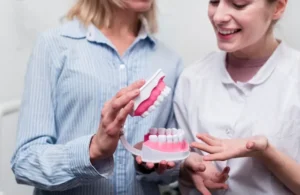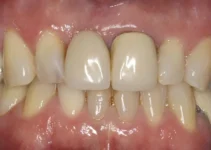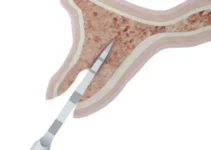Permanent dentures offer a reliable solution for those seeking to restore their smile and oral functionality. Unlike traditional removable dentures, these are designed to be a more stable and durable option, often anchored to dental implants. This enables a natural look and feel, enhancing not only the aesthetic aspect but also the overall quality of life. By opting for permanent dentures, individuals can enjoy their favorite foods and speak more comfortably without the worry of slipping dentures. Furthermore, they help preserve jawbone and facial structure, preventing the sunken appearance commonly associated with tooth loss.
Understanding Permanent Dentures
What Are Permanent Dentures?
Permanent dentures, often referred to as “fixed dentures” or “non-removable dentures,” are prosthetic devices designed to replace missing teeth. Unlike traditional removable dentures, permanent dentures are securely anchored into the jawbone using dental implants. This not only provides a more stable and comfortable fit but also functions and feels much like natural teeth.
The use of dental implants for permanent dentures has gained popularity due to their high success rate and durability. Studies, such as those conducted by Albrektsson et al. and Ten Bruggenkate et al., have shown that dental implants can achieve long-term success rates of over 90%, making them a reliable option for tooth replacement.
Permanent dentures offer several benefits, including:
- Improved Mastication: Since they are securely fixed, patients can chew and eat with greater ease and confidence.
- Enhanced Aesthetics: They look and feel more like natural teeth, enhancing the patient’s smile and facial structure.
- Stability and Comfort: There is no risk of the dentures slipping or causing discomfort, which is a common issue with removable dentures.
How Are Permanent Dentures Made?
The process of creating permanent dentures involves several steps, each crucial to ensure a successful outcome. Initially, a comprehensive dental examination is conducted to assess the patient’s oral health and bone density. Advanced imaging techniques, such as CT scans and X-rays, are often used to obtain detailed views of the jawbone and identify the ideal locations for implant placement.
Once the treatment plan is established, the next phase involves placing the dental implants into the jawbone. These implants act as artificial tooth roots and require a healing period, known as osseointegration, during which the bone fuses with the implant surface. This crucial step, highlighted in research by Akca and Iplikcio lu, ensures the stability and longevity of the implants.
After successful osseointegration, the abutments, which are connectors, are attached to the implants. These abutments serve as the foundation for the permanent dentures. Impressions of the patient’s mouth are then taken to create custom-fit dentures that match the natural appearance and functionality of the original teeth.
Finally, the permanent dentures are securely fastened to the abutments, completing the process. Regular follow-up appointments are essential to monitor the implants’ health and ensure proper fit and function of the dentures.
Understanding the intricacies of permanent dentures can greatly empower patients to make informed decisions about their dental health. For more information on dental implants and other advanced dental solutions, explore our other articles.
Benefits of Permanent Dentures
Improved Oral Health
Permanent dentures, also known as implant-supported dentures, offer a significant improvement in oral health compared to traditional removable dentures. One of the key advantages is the prevention of bone loss. When you lose teeth, the jawbone begins to deteriorate due to a lack of stimulation. Dentures that are anchored by dental implants provide the necessary stimulation to the jawbone, thereby preventing bone resorption.
Additionally, permanent dentures make it easier to maintain better oral hygiene. Traditional dentures can trap food particles and bacteria, increasing the risk of gum disease and cavities in remaining teeth. Implant-supported dentures are easier to clean, reducing the risk of oral infections and promoting healthier gums.
- Prevention of bone loss
- Reduction in gum disease
- Easier maintenance of oral hygiene
Studies, including those by Albrektsson et al. (1986) and Ten Bruggenkate et al. (1990), have shown that implant-supported dentures offer a long-term solution for improved oral health, thereby increasing the overall success rate of dental implants.
Enhanced Appearance
Permanent dentures offer a more natural appearance compared to traditional dentures. Because they are custom-designed to fit your mouth, they provide a realistic look that closely mimics natural teeth. This can greatly boost your confidence and self-esteem.
The use of dental implants to anchor the dentures ensures that they remain securely in place, preventing the unsightly slipping and shifting that often occurs with traditional dentures. This secure fit not only enhances your appearance but also improves your ability to speak clearly. Moreover, because they help maintain the structure of the jawbone, implant-supported dentures prevent the facial sagging and sunken appearance that often accompanies the loss of multiple teeth. This contributes to a more youthful appearance, allowing you to look and feel your best.
The combination of a natural look and the prevention of facial deterioration makes permanent dentures a superior choice for anyone concerned with both function and aesthetics.
Increased Comfort and Stability
One of the most significant advantages of permanent dentures is their comfort and stability. Unlike traditional dentures that can slip and cause discomfort, implant-supported dentures are firmly anchored to your jawbone. This stability means you can eat, speak, and smile with confidence without worrying about your dentures moving out of place. The custom fit of permanent dentures also helps to distribute the force of your bite evenly across the implants, reducing pressure on any one area of the gums and providing a more comfortable experience. This even distribution of force is especially beneficial for those with sensitive gums or other oral health issues.
- Enhanced stability
- Improved comfort
- Even distribution of bite force
In a study by Akca and Iplikcio (2002), the use of implant-supported dentures was shown to significantly increase patient comfort and satisfaction compared to traditional dentures. This makes them an excellent investment in your oral health and overall well-being.
If you found this article helpful, we encourage you to explore other posts on our blog to learn more about the latest advancements in dental technology and oral health care.
Considerations for Long-Term Use of Permanent Dentures
The long-term use of permanent dentures, often supported by dental implants, has revolutionized the field of restorative dentistry. According to Albrektsson et al. (1986) and Ten Bruggenkate et al. (1990), the efficacy of currently used dental implants is well-documented, though there are several considerations to keep in mind for their long-term success. These considerations include thorough maintenance and care, as well as the understanding of potential risks and complications.
Implant-supported permanent dentures require a multifaceted approach to ensure longevity. This involves not only the technical expertise of the dentist but also the patient’s commitment to maintaining oral hygiene. Studies by Akca and Iplikcio (2002) indicate that even short implants can be effective if proper care is taken, highlighting the importance of patient adherence to recommended maintenance practices.
To maximize the lifespan and functionality of permanent dentures, both patients and dental professionals should remain vigilant about regular checkups and timely interventions whenever issues arise. By doing so, the dental implants and the dentures they support can provide reliable, long-term solutions for tooth loss.
Maintenance and Care
Maintaining permanent dentures begins with a rigorous and consistent oral hygiene routine. This includes daily brushing and flossing, as well as using specialized tools to clean around the implants. According to widely accepted practices, patients should also use anti-bacterial mouth rinses to minimize the risk of infection.
Routine dental check-ups are crucial for monitoring the condition of both the dentures and the supporting implants. During these visits, clinicians can identify and address issues such as plaque buildup, gum inflammation, or any early signs of implant failure. It’s also a good time to make adjustments to the dentures to ensure a proper fit and optimal function.
Patients should be educated on the importance of avoiding habits that can compromise the integrity of the dentures and implants. This includes smoking, which has been shown to significantly increase the risk of implant failure, and avoiding overly hard or sticky foods that can damage the dentures.
Potential Risks and Complications
While the success rate of dental implants is high, there are potential risks and complications that must be considered. One of the primary concerns is peri-implantitis, an inflammatory condition that affects the soft and hard tissues around the implant. If left untreated, peri-implantitis can lead to the loss of the implant.
Another possible complication is implant loosening. This can be caused by inadequate bone integration or excessive force applied to the implant. Regular follow-ups with the dental professional can help detect and mitigate these issues early.
Patients with certain systemic conditions such as diabetes or osteoporosis may experience a higher rate of complications. It’s essential for these patients to work closely with both their dentist and primary care provider to manage their overall health in conjunction with their dental care.
Furthermore, the use of short implants in certain cases can pose a risk due to the limited surface area for osseointegration. However, Akca and Iplikcio (2002) demonstrated through finite element stress analysis that short implants can still be an effective solution, provided they are used correctly and maintained diligently.
Understanding these potential risks and complications enables patients to make informed decisions about their dental care and encourages them to participate actively in maintaining their oral health. By addressing these considerations, the long-term use of permanent dentures can be highly successful.
For more in-depth information on related topics, we encourage you to explore our other articles on dental implants, oral hygiene practices, and advanced restorative dentistry techniques.
FAQs on Permanent Dentures
Explore the most commonly asked questions about the effective long-term use and success criteria of permanent dentures.
What factors contribute to the longevity of permanent dentures?
Longevity of permanent dentures is influenced by several key criteria, including proper implant selection, accurate placement, and the quality of ongoing maintenance and care. Studies underscore the importance of using implants that suit the specific conditions of the patient’s oral environment and maintaining meticulous oral hygiene post-operation to ensure successful long-term outcomes.
What are the success criteria for permanent dentures according to recent studies?
The success of permanent dentures largely depends on the stability and osseointegration of the dental implants. Research has established criteria such as the absence of persistent pain, infection, or neuropathy, and minimal bone loss around the implant over time as indicators of successful implantology. Regular follow-ups and adherence to these criteria are crucial for the enduring success of permanent dentures.

My name is Salman Kapa, a 73-year-old expert in bone regeneration and dental implantology. With decades of experience in the field, I am dedicated to advancing our understanding of oral health and hygiene. Through my research and writing, I aim to contribute to the development of innovative solutions in dental care.




